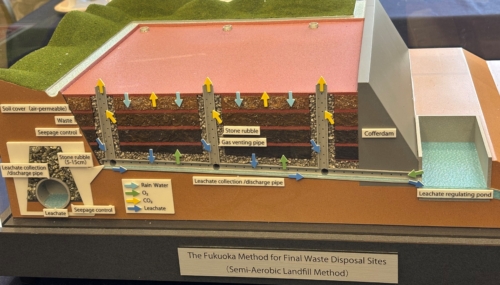
Carbon credit project using semi-aerobic landfill method in Tunisia under JCM
26.05.2025

Vienna, 26 May 2025 – UNIDO has recently concluded an agreement for the provision of a grant to EX Research Institute (EXRI), a Japanese company, to implement the world’s first-ever carbon crediting project by applying the Fukuoka method (semi-aerobic landfill) in a waste management project in Beja, Tunisia under the UNIDO project “Promoting Climate Innovation and Partnership for Transition Towards Deep Decarbonization (UNIDO-JCM)”, which is funded by Ministry of the Environment of Japan.
The Joint Crediting Mechanism (JCM) established by the Government of Japan in cooperation with the partner countries aims to facilitate the diffusion of leading decarbonizing technologies to achieve the objectives of the Paris Agreement. This effort contributes to GHG emissions reduction and sustainable development in JCM partner countries, aligning with the NDCs of the JCM partner countries and Japan. Both the governments of the JCM partner countries and Japan mutually recognize that a portion of JCM credits generated from emission reductions through the implementation of JCM projects may be used towards the achievement of NDCs in the respective countries. This ensures that double counting is avoided through corresponding adjustments, in accordance with the provisions outlined in Article 6, paragraph 2, of the Paris Agreement. JCM project is managed under the JCM rules and guidelines established under the Joint Committee between each JCM partner country and Japan.
UNIDO-JCM facilitates early JCM projects formulation in African JCM partner countries (Kenya, Ethiopia, Tunisia and Senegal (as of April 2025)). Firms from Japan and African JCM partner countries work together to formulate JCM projects supported by UNIDO grants allocated for: (1) CO2 emission reduction by decarbonization technologies (renewables, energy efficiency), and (2) methane emission reduction from waste management by applying the Fukuoka method (semi-aerobic landfill). The maximum amount of grants to be provided to the Japanese company for each successful proposal is up to USD 1.5 million and the grant applicants shall provide co-financing of at least 25% of the total amount of the eligible project cost, which is described in the Call for Proposals (CfPs) documents.
The Fukuoka method is a semi-aerobic landfill management technique developed in Fukuoka, Japan, during the 1960s. This method is designed to accelerate the decomposition and stabilization of waste through natural ventilation. By introducing air into the landfill, the Fukuoka method enhances the breakdown of organic materials and reduces the production of harmful gases include methane, a greenhouse gas. This is achieved by installing pipes that facilitate the quick drainage of leachate, thereby preventing the accumulation of water and promoting aerobic conditions. The introduction of the Fukuoka Method will not only contribute to reduce methane emissions but also improve the environmental conditions in the surrounding area, including air quality, groundwater protection, and odor control. For implementing the Fukuoka method applied project under UNIDO-JCM, for which UNIDO and EXRI have concluded a grant agreement, EXRI and Tunisian National Waste Management Authority (ANGED) have in turn formed a consortium to introduce a Fukuoka method cell of approximately 3,400 m² at the Beja landfill site in Tunisia.

There is another project under UNIDO-JCM that has been already implemented, and which was aimed to install and operate 220 kW photovoltaic system with 240 kWh BESS storage battery at a rose farm in Kenya.
The CfPs in 2025 for UNIDO-JCM is scheduled to be published in early summer.
For more information:
UNIDO-JCM: https://compass.unido.org/projects/210002
JCM: https://www.jcm.go.jp/
Contact:
Shogo Masuda
Industrial Development Expert
Energy Systems and Industrial Decarbonization Unit
TCS/ECA/ESD
*this article has been cross-posted from www.unido.org .

